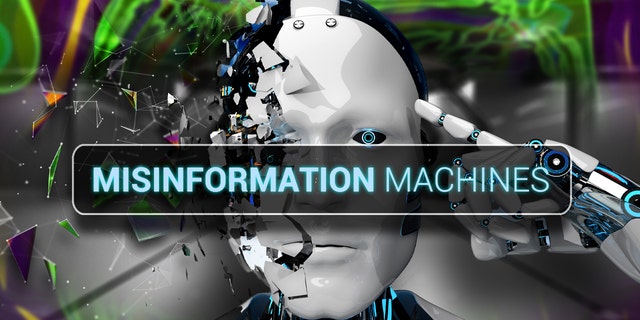
NEWYou can now listen to Fox News articles!
Imagine waking up tomorrow to find that MLB Commissioner Rob Manfeld has made yet another rule change in America’s pastime: All performance-enhancing drugs are legal. Imagine the increases in strength, speed and endurance that baseball would have to deal with as players on every team experimented with pharmaceutical cocktails to give them the ultimate edge.
What we’re about to see in the 2024 election cycle, with the introduction of artificial intelligence, is the rise of “performance-enhancing digital.”
AI will revolutionize politics in the coming months. Across America, agencies and digital agents—Democrats and Republicans—are already experimenting, and while the results are hard to predict, the differentiating factor for the winning side will be who best leverages AI to its fullest potential.
It won’t be long before discerning reality becomes a challenge; in fact, it’s already happening. (Getty Images)
For starters, there are extraordinary applications for AI to navigate the oceans of data that campaigns produce. But while there’s a lot of hype around ChatGPT and the myriad of new AI tools introduced in recent months, machine learning tools from companies like Facebook, Google and Trade Desk have been helping top agencies to fulfill their tasks for years.
AI HAS POWER TO ‘MANIPULATE’ AMERICANS, SAYS SEN. JOSH HAWLEY, DEFENDING THE RIGHT TO SUE TECHNOLOGY COMPANIES
The challenge is to translate all the ideas into actionable strategies. So far, AI has a hard time doing this job. Even the most cutting-edge AI can’t match the accuracy of human experience when you consider all the other inputs that optimize strategy and make a campaign successful, from the speed of the current news cycle to to the responsible use of cash.
The best practice is to leverage AI as an accelerator, allowing policymakers to scale ideas much faster once they’ve brainstormed in the first place and decided to execute on them.
Copywriting for fundraising emails, captions for social media posts, and scripts for campaign videos can now be produced with an unprecedented level of speed, customization, and diversity. But before agencies put their production on AI autopilot, they need to consider the downsides. Personally, I’m finding that the AI output almost always lacks an important, imperceptible quality. (Our team calls it “soul”).
Soul translates into the special nuances that add authenticity, which is how we connect with voters. We’ve gotten pretty clever with tricks to make the AI more accurate, but I’m skeptical of any campaign that relies too much on AI-produced content. It will likely contribute to lazy, cookie-cutter messaging that decreases audience perception and engagement. All it does is hurt your fundraising by leaving your brand vulnerable to being labeled as artificial and inauthentic.
FOX NEWS POLL: BEST REACTIONS TO AI? VOTERS SAY “DANGEROUS” AND “SCARED”
What is clear is the slippery slope associated with AI. I am more concerned about disinformation, deep fakes and AI generated images. From what I’ve seen firsthand, it won’t be long before discerning reality becomes a challenge; in fact, it’s already happening. The imprisonment of Donald Trump and Vladimir Putin are two examples.)
Just on a practical level, consider a current ethical conundrum: Is it acceptable for a political agency to write an email in a candidate’s voice, sign their name, and send it to their supporters? But what if artificial intelligence is used to generate the candidate’s script, mimic their voice and overlay the words onto the pre-recorded footage with no visible disclaimer?
This is not science fiction; these tools are now available. Where do we draw the line?
Agencies and consultants in the political business are usually held to an ethical standard. However, with the advancement of easy-to-use AI tools, deep fakes are surprisingly easy for any individual, with no ties to a particular campaign, to generate and distribute at lightning speed. With this in mind, our ethical standard becomes more important than ever.
Building the AI plane in flight seems monumental. But let’s be clear: AI isn’t ready to campaign solo.
Consider baseball: even if all players started using performance-enhancing drugs, the new norm would soon be established. Coaching, analysis and the innate abilities of the players would still rule. This election cycle, I predict the digital industry will be animated by AI, but campaigns with experience and creative firepower will still win.
CLICK HERE TO GET THE FEEDBACK
Right now, AI is a tool with mind-boggling potential and limitless scale, but it’s a tool that needs human hands. Human beings will still create the real advantage and win the election.
As for the ethical tightropes, they are currently navigated by people who have a mandate to win at all costs. Politics will get messier. Many expect AI to be responsible for this election cycle’s “October Surprise.” While this may be likely, there is still time for global audiences to become conditioned to AI-powered messaging.
As tools become more ubiquitous and more integrated into daily life, we can only hope that our eyes for detecting AI will adapt as well. Let’s hope we are quick enough to see the revolution.
CLICK HERE TO GET THE FOX NEWS APP
[ad_2]
Source link





